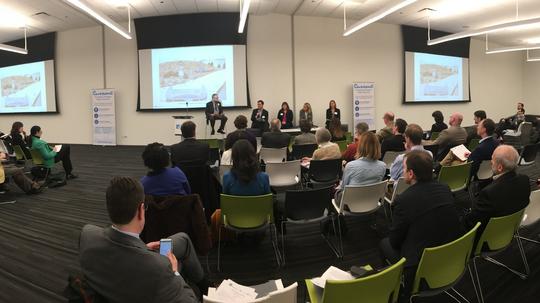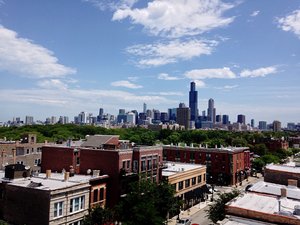
Living on the shores of the world’s largest reserves of freshwater, many Chicagoans tend to take Lake Michigan and access to freshwater, for granted. But one does not have to venture out too much further west to see communities increasingly dependent on groundwater rather than freshwater, as this research from the Illinois state water survey shows.
Groundwater is the water that seeps into the earth and is stored in aquifers—areas of soil, sand, and rock that are capable of holding liquid. In addition to drinking water, this groundwater is also extracted for irrigation purposes -- but aging infrastructure, population demands, changing weather patterns and industrial pollution are all causing a threat to this important resource.
According to the city's economic development agency World Business Chicago (WBC), Chicago’s robust water economy is the 4th largest in the nation and has produced an average 83 patents per year for water innovations. Regional water companies currently employ more than 99,589 people.
How then, can the city leverage, maintain and raise the profile of this important sector of the economy? These two projects might point to the answer: collaboration.
Current
Founded by the city, the Metropolitan Water Reclamation District of Greater Chicago (MWRD), and WBC, Current hopes to increase research, investment and employment in the Chicagoland water industry.
Officially announced a little over a year ago, Current was incubated and spun out of WBC. Today, it very much operates as a lean startup -- with only four active staff members. Chicago Inno spoke to Steve Frenkel, inaugural Executive Director and Dr. Seth Snyder, a leading water researcher at Argonne National Labs who came on board as Chief Scientist for Current.
“Chicago has in its backyard world class research universities, two federal research labs, an active civic community focused on solving urban challenges, major water utilities, a growing investor base looking at the water-energy nexus, and political leadership which wants to firmly establish Chicago as a global center for water and sustainability innovation. What Current is doing is bringing these entities together”, said Frenkel.
Current is also using its convening platform to establish a ‘tech-to-market’ pipeline for nascent startup technologies tackling water related issues. Its three pronged approach hopes to amplify research, provide full scale field testing opportunities, and help validate or de-risk these ideas to enable them to scale to market.
At Argonne, Dr. Snyder has been involved for a number of years on water and sustainability projects. He envisions the next wave of technologies -- similar to Argonne’s oleo sponge -- enabling wastewater treatment plants to become sustainable energy producers. Despite uncertainties in federal funding, he remains optimistic about water and calls it an issue transcending bipartisan politics.
So far, Current is actively raising its profile as a convening organization. Last month, Current co-hosted (with UI Labs' City Digital initiative) Mayor Emanuel’s delegation of seventeen international Mayors in town for an Urban Waterways Summit, to learn from global best practices and profile local technology innovations in the water space. Also in March, Current launched its research consortium to facilitate applied research and bring together leading scientists and engineers from the area's leading research universities. And, to commemorate World Water Day, Current co-sponsored a conference at West Monroe Partners, a Chicago-based management consulting firm, addressing water risks facing Chicago-area industries and businesses.
Current will also be headlining this fall’s WEFTEC Summit in Chicago, the world’s largest gathering of water researchers and policy practitioners. Further, Current is conceptualizing a civic hackathon challenge to crowdsource solutions to some pressing challenges in the water space.
City Digital's Smart Green Infrastructure Monitoring Project
With changing weather patterns, storms in the Chicagoland area have become increasingly different -- they are hyperlocal in nature, bring in more water in less time and have become less predictable. Stormwater has caused over $770 million in damage and resulted in over 180,000 claims of property damage in Chicago over the last 5 years alone.
To better understand the implications of this issue, the city partnered up with UI Labs' City Digital initiative, which collects urban data by using the city as a "testbed for experimentation". The"UI" stands for "University-Industry" -- and the project has multiple partners, such as Microsoft, Accenture, AECOM, ComEd and the University of Illinois at Urbana-Champaign.
The project builds on a $50 million allocation from the city to augment the existing sewer system with green infrastructure, by collecting data from four public sensors across the city. The sensors monitor the performance of a variety of green infrastructure, including permeable pavements and tree grates, and collect information on weather, humidity, air temperature, soil moisture and more.
The city picked the locations for the pilot program to test the technology: at the corner of Broadway and Argyle in Uptown, on Langley Avenue in Roseland, outside the UI Labs office in Goose Island and on Cottage Grove in Greater Grand Crossing.
The first set of data from the sensors will be released on to the city's open data portal this week, with the objective of empowering communities to become more informed about their local environment and contribute their voice to decision making wherever possible.
Note: This article has been updated to reflect the role and composition of Current's staff and founding organizations.








